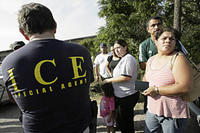-
Studying wait times at modified truck fast lane
Western Washington University has received $49,000 to conduct field research on wait times and lane reconfiguration at the U.S.-Canada border; the university’s Border Policy and Research Institute will collect and analyze data on wait times as part of a pilot to examine alternative use of the dedicated Free and Secure Trade truck lane at the Blaine crossing
-
-
New SPEXER security radar offers new capabilities in threat detection
Cassidian, the renamed defense and security division of EADS, is showing its new security radar; the company says that SPEXER 2000 is the first security radar using the newest radar technology of Active Electronically Scanning Array (AESA); by electronic guidance of the radar beam, this technology enables the sensor to fulfill several tasks at the same time while increasing the detection capability substantially; therefore, one SPEXER 2000 can replace two or more conventional radars
-
-
A warming world would add billions to shipping costs
As anyone with a boat knows, many sorts of marine life can attach themselves to a hull below the waterline; on a large ship, the weight of such hitchhikers — everything from algae to barnacles to small colonies of coral — can weigh as much as ten tons; the U.S. shipping industry spends more than $36 billion each year in added fuel costs to overcome the drag induced by clinging marine life or for anti-fouling paint that prevents that life from hitching a ride in the first place; global warming will see the problem of hull-clinging creatures worsen substantially
-
-
Agriculture industry concerned over expansion of E-Verify
As Congressional lawmakers look to expand the E-Verify program to crack down on undocumented workers, businesses have become increasingly uneasy with the proposal; Arizona, Utah, and Mississippi have required all employers to use the system, and House GOP leaders are following their lead and pushing to make the system compulsory for all businesses across the United States; critics fear that making the program mandatory could destabilize critical sectors of the economy; the agriculture industry is particularly concerned as they depend heavily on undocumented workers for labor and worry that mandating the system could potentially jeopardize millions of jobs in the industry; proponents of expanding E-Verify believe that it is a better alternative to the existing I-9 screening process which has been easily circumvented with forged documents
-
-
Jeb Bush and former Mexican president to headline ASIS 2011

Former governor of Florida Jeb Bush and former president of Mexico Vicente Fox have both agreed to speak at this year’s upcoming ASIS International annual conference in Orlando, Florida; the two former elected officials will be the event’s keynote speakers along with Burt Rutan, the designer of SpaceShipOne, the first privately built manned spacecraft to reach space; last year roughly 22,000 professionals from more than ninety countries attended; this year’s conference is scheduled to take place from 19 September to 22 September 2011; it was estimated that 21 percent of buyers attending last year’s conference were planning on procuring at least $5 million worth of security products and services for the year
-
-
Oil giants struggle to find more oil
Last week Exxon Mobil Corp’s annual financial report showed that the world’s largest oil company was struggling to find more oil; the report revealed that Exxon had only replaced 95 percent of the oil that it pumped out of the ground over the last decade; Exxon now holds more natural gas reserves than oil for future production; the company has replaced its natural gas reserves at higher rates than oil; in recent years large western oil companies have found that most of the accessible oil fields have been tapped, while new regions have been difficult to access both technically and politically; in 2010 Chevron announced that it had only replaced one barrel for every four it produced and Royal Dutch Shell PLC recently announced that next year it will produce more gas than oil for the first time in its company’s 104-year history
-
-
Hummingbird-sized UAV developed

A bird-sized unmanned aerial vehicle that flaps wings for propulsion and hovering has been developed by the U.S. company AeroVironment; The aircraft has a wingspan of 6.5 inches and has a total flying weight of two-thirds of an ounce, which is less than the weight of a common AA battery
-
-
Industry wants current safety law extended rather than see it toughened
Before the House Homeland Security committee, Timothy J. Scott, the chief security officer of Dow Chemical Co., urged Congress permanently to reauthorize the Chemical Facility Anti-Terrorism Standards (CFATS) bill; under CFATS chemical facilities are required to address a range of critical security concerns including protecting facilities against attacks and preventing the theft of dangerous chemicals; currently, more than 35,000 facilities that use or store chemicals are required to meet CFATS regulations; DHS has worked with facility owners to mitigate risks with custom developed security plans at more than 2,000 “high risk” sites
-
-
Airport Screeners allowed to unionize and bargain collectively
John Pistole, the head of the Transportation Security Administration (TSA), last Friday announced that he would authorize unions to bargain on behalf of the TSA’s 45,000 airport screening officers; unions will be allowed to bargain collectively over specific issues including regulations on vacation time and shift assignments, workplace transfers, and recognition for good work; topics that unions usually bargain for like pay, retirement, benefits, disciplinary standards, job qualification rules, safety equipment and where it is deployed will not be open to negotiation; this unique arrangement is designed to allow DHS the flexibility to quickly reassign screeners, change procedures, and alter equipment in response to a security threat; Pistole hopes that this arrangement will boost employee morale and performance; in surveys on employee morale and job satisfaction, TSA often performs poorly compared to other government agencies
-
-
DHS reducing reliance on contractors
The Obama administration has sought to reduce the government’s dependence on contractors that the Bush administration relied upon so heavily during the formation of DHS; DHS has reviewed approximately 100 service contracts to see which should be assigned to an internal department rather than an outside vendor; the contract review project will serve as a template for future evaluations of all the department’s approximately 10,000 service contracts
-
-
Hackers steal data from oil giants worth millions
McAfee Inc. recently announced that hackers have stolen data worth millions from five major multinational oil and gas companies; in the attacks, dubbed “Night Dragon,” hackers stole company secrets like bidding contracts, oil exploration data, proprietary industrial processes, and sensitive financial documents; analysts determined that hackers initially began infiltrating company networks in November 2009 using relatively simple methods; the information that the cyber thieves took was “tremendously sensitive and would be worth a huge amount of money to competitors”; the methods of execution and circumstantial evidence implicate China
-
-
Group calls for biometric component to E-Verify program

The Security Industry Association (SIA) has called for the incorporation of biometrics into the E-Verify program to prevent fraud and increase accuracy; a recent Government Accountability Office (GAO) report found that the E-Verify system was vulnerable to fraud and identity theft; a recent audit of Chipotle by ICE agents revealed that many employees are using forged documents to work in the United States; SIA recommends using biometrics to bind an individual to their identity documents, requiring biometric authentication of individuals when they apply for employments, and distributing smart cards to individuals that contain their biometric data; in 2009 nearly 8.2 million new employees were identified using the E-Verify system and this number is set to steadily grow as more states mandate employers to use the program for new hires; roughly 1,400 employers are joining the system each week
-
-
Biometric scans at Aussie bars spark privacy law controversy
Bars and nightclubs in Australia are implementing more stringent verification procedures by requiring prospective patrons to submit to fingerprint scans, photos, and ID inspections; government officials are concerned with the new trend; Australian Federal Privacy Commissioner says that he lacks the authority to audit the system and that there are no regulations in the industry that govern how the data is collected, stored, used, or shared
-
-
Biometric wallet keeps your money safe

Luxury goods maker Dunhill has designed a “virtually indestructible” wallet that uses a biometric fingerprint scanner to deter muggers and pickpockets; the wallet will only open when the owner’s fingerprint is verified using a scanner similar to those currently on many laptops; additional security features include a Bluetooth sensor that can be synced to any Bluetooth enabled mobile device; when the wallet is more than fifteen feet away from the mobile device, it will sound an alarm alerting the owner that the wallet has been taken away
-
-
Powerful magnets developed to end rare earths dependency
Scientists at General Electric’s Global Research are currently developing powerful new magnets that are stronger, lighter, and use less rare Earth metals; researchers hope that the new magnets will help reduce U.S. dependence on China’s supplies of rare Earth metals, which have been subject to disruption; the new magnets are being created with nanocomposites which consist of combining tiny particles of various magnetic alloys to create more reactive coatings; GE has received $2.25 million from the Department of Energy to develop these magnets
-
More headlines
The long view
Ransomware Attacks: Death Threats, Endangered Patients and Millions of Dollars in Damages
A ransomware attack on Change Healthcare, a company that processes 15 billion health care transactions annually and deals with 1 in 3 patient records in the United States, is continuing to cause massive disruptions nearly three weeks later. The incident, which started on February 21, has been called the “most significant cyberattack on the U.S. health care system” by the American Hospital Association. It is just the latest example of an increasing trend.
Chinese Government Hackers Targeted Critics of China, U.S. Businesses and Politicians
An indictment was unsealed Monday charging seven nationals of the People’s Republic of China (PRC) with conspiracy to commit computer intrusions and conspiracy to commit wire fraud for their involvement in a PRC-based hacking group that spent approximately 14 years targeting U.S. and foreign critics, businesses, and political officials in furtherance of the PRC’s economic espionage and foreign intelligence objectives.
European Arms Imports Nearly Double, U.S. and French Exports Rise, and Russian Exports Fall Sharply
States in Europe almost doubled their imports of major arms (+94 per cent) between 2014–18 and 2019–23. The United States increased its arms exports by 17 per cent between 2014–18 and 2019–23, while Russia’s arms exports halved. Russia was for the first time the third largest arms exporter, falling just behind France.
LNG Exports Have Had No Impact on Domestic Energy Costs: Analysis
U.S. liquified natural gas (LNG) exports have not had any sustained and significant direct impact on U.S. natural gas prices and have, in fact, spurred production and productivity gains, which contribute to downward pressure on domestic prices.
